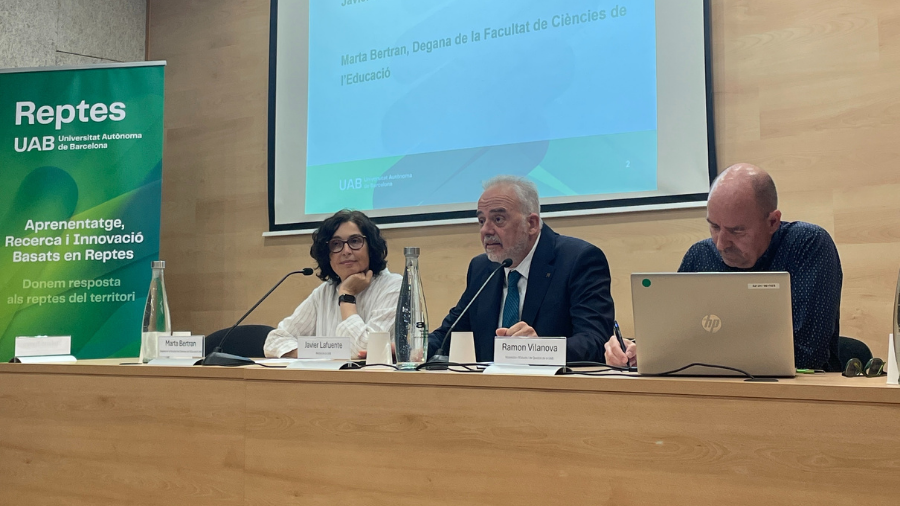«The ABR helps us train students capable of solving real problems»
On Tuesday 17 June the UAB became the epicentre of the pedagogical debate around a methodology that seeks to break down walls between campus and reality: challenge-based learning (CBL). Amidst an atmosphere of lively and committed exchange, the Faculty of Education hosted the 2nd Challenge-Based Learning Conference, an event that brought together some 80 people to focus on this innovative methodology used to address the real problems of a region.

The day began at 9:30 a.m. with an institutional welcome by the rector of the UAB, Javier Lafuente, and the dean of the Faculty of Education, Marta Bertran. Dean Bertran highlighted the pedagogical and social value of this approach: "Challenge-based learning is not only a teaching strategy; it is above all a form of commitment with the surrounding region. It forces us to listen, to establish links and to make the university an institution that is close to the people, connected with reality".
Javier Lafuente reaffirmed the institutional commitment to this methodology and emphasised its educational and social impact: "CBL is an educational tool of great impact because it is an integrative, motivating and socially committed methodology. It helps us to prepare students to be capable of solving real problems, with a multidisciplinary and critical viewpoint".
Vice-Rector for Studies and Quality Ramon Vilanova then gave way to the first international speaker of the day, Professor Stefano Turrini, from the University of Trento and emphasised the transversality of the methodology and its transformative potential: "The connection with the region is one of the key aspects that differentiates CBL from other conventional approaches. It is precisely this link that makes learning more meaningful and transformative".
In his presentation, Stefano Turrini, researcher and facilitator of CBL practice communities in Trento, highlighted the value of this approach to generate tangible impact: "CBL is not about fictitious problems. It deals with real challenges. If there is no involvement of external actors, it's not CBL. It is something else. [...] It is a flexible methodology, but there are fundamental pillars: real challenges, collaboration with the surrounding environment, multidisciplinarity, teamwork and actions oriented toward sustainable impacts".
Turrini shared best practices from the School of Innovation and the Department of Information Engineering at the University of Trento, and valued the importance of the international CBL community to share knowledge and common challenges: "It is very important that we connect, that we share experiences, that we do not close ourselves in our campuses. We are fighting the same battles".
At 10:30 a.m., a round table on practical experiences at the UAB allowed to hear first-person accounts of faculty and students who have participated in CBL projects. It was moderated by Silvia Blanch, vice-dean of Internships and secretary of the Faculty of Education, and included Sergi Robles, lecturer of the Department of Information and Communications Engineering; Adriana Gil Juárez, of the Department of Basic, Developmental and Educational Psychology and representative of the School of Consumption of Catalonia; José Luis Lalueza and Marisela Montenegro, lecturers of the Department of Basic, Developmental and Educational Psychology, and students Míriam Hernández and Nys Garcia.
At 12:00 noon, Teresa Sordé, professor of Sociology at the UAB, provided a sociological perspective on the impact that this approach can have in solving specific challenges in the region. Then, Óscar Redondo, coordinator of the Challenges Office, explained the resources and support offered by the UAB to promote CBL in bachelor's and master's degrees.
The day ended with two parallel lectures focused on real challenges, presented by the Cerdanyola del Vallès City Council and the Nexe Foundation, which showed how the University can have a direct impact on the social reality that surrounds it.
Vice-Rector Vilanova was also in charge of the closing ceremony, where he pointed out the need to consolidate the CBL as a transformative axis of university teaching.
The UAB, with Sustainable Development Goals
Quality education